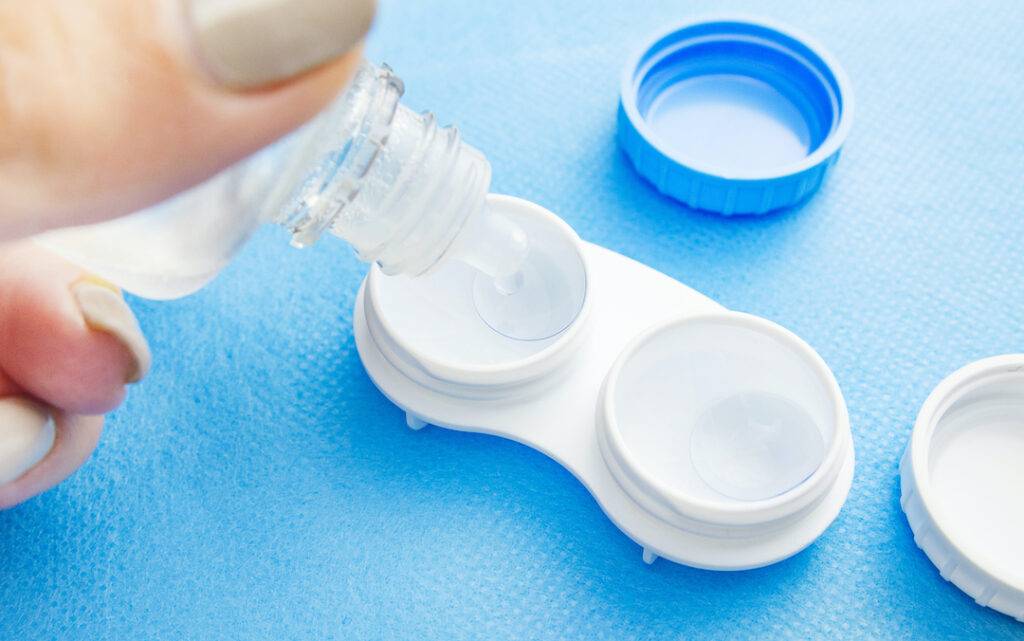Different types of contact lenses expire at different times, so know when it’s time to get rid of your old ones for a new pair
Have you ever stumbled upon an old pair of contact lenses, squinted at the small print, and wondered, “Do old contact lenses ever expire?” Maybe it’s a pack shoved in your medicine cabinet or one hiding in the depths of your suitcase. We’ve all been there.
It is possible that you left a set of contacts out overnight without storing them properly, and they have dried up—have they expired at that point? There are a lot of contact lens wearers who don’t yet know all of the rules for when you should say goodbye to your current pair of contacts.
So, when do contact lenses expire? Trust the experts at Linneo to guide you. Plus—if you want to save on contact lenses, you can search for individual vision insurance or an eyewear savings plan that works for you
Spoiler alert: Yes, when contacts expire, they do expire. Trust us—this isn’t something you want to risk.
Table of Contents
Understanding Contact Lens Expiration
The expiration dates on your contact lenses aren't just arbitrary numbers

The shelf life of contacts is generally 4-5 years after packaging, as confirmed by research. It’s worth having a look at the date if you have new contacts or an old box of lenses lying around.
You can usually find the expiry date printed alongside other information like lot number and lens type. But why does it matter?
An expired contact lens might not look different from one within its use-by period. However, there are invisible changes that could harm your eyesight or comfort level when wearing expired contacts.
If you accidentally wore expired contacts without knowing their condition first-hand – don’t panic. But remember, next time you wear an expired one, make sure to check before wearing it.
Expired contacts may have lost their disinfecting power due to being stored too long in saline solution, which itself has an expiration date.
This risk is more than discomfort—it’s about health, too. Wearing these outdated products increases the chances of eye irritation or infections—a situation nobody wants.
Proper Lens Care & Contact Lens Solution
Caring for your contact lenses is not a task to take lightly
To help you understand just how important it is to take care of your contact lenses, Linneo is offering advice on the best way to take eye care and contact lenses. Let’s take a look!
You may think it’s just saline solution in that little bottle. This liquid plays an essential role as its disinfecting power helps keep harmful bacteria at bay and extends the life of your contacts. So always check expiration dates before you use any contact solution. Yes, even solutions expire. Using an expired solution or incorrect lens solutions can damage your contacts and potentially harm your eyes.
An outdated product might lose its effectiveness against microbes, leading to an increased risk of infection. Remember to be smart about how you wear and care for those delicate discs sitting on top of your eyeballs.
Risks of Wearing Expired Contact Lenses
Have you ever accidentally worn expired contacts? The risks involved might make you think twice next time
Pseudomonas aeruginosa, a potentially dangerous bacteria, is the primary source of contamination in expired contact lenses that can lead to severe eye infections and even corneal ulcers. This little pest can easily contaminate expired contact lenses and lead to serious eye infections, even corneal ulcers. Trust me, that’s an experience worth avoiding.
Research shows wearing expired contacts increases your risk of these conditions significantly. Not just by a small margin either – we’re talking about upping your chances for irritation, serious eye infections, and abrasions on the delicate surface of your eyes.
The Dangers of Pseudomonas Aeruginosa
This bacterium is no joke—it loves warm, moist environments, like an old pair of contact lenses. Once it finds its way into your eyes via those outdated pieces of plastic sitting there like Petri dishes, it can lead to a serious infection.
Serious infections caused by this bacteria can actually lead to permanent vision damage. That’s right, folks—choosing convenience over safety could cost you more than some temporary discomfort— it could cause permanent damage.
Understanding Contact Lens Packaging
Learn more about the importance of intact packaging for your contact lenses and how to store them properly

Let’s take a minute to understand why a broken or weak seal on your contact lens package could put your eyes at risk. The seal on your contact lens package is more than just packaging—it’s an essential safety measure. When this seal stays intact, it keeps out bacteria that could harm your eyes.
A broken or weak seal can let harmful contaminants into the saline solution blister pack. This breach puts your eyes at risk because of potential bacterial contamination from everyday environments.
The saline solution in these packs can deteriorate after its expiration date. So remember—always check for any signs of damage before using a new pair of contacts. Maintaining good eye health involves more than just wearing clean glasses or fresh contacts. It starts right from how you handle those little plastic packets holding your vision aids.
The Importance of Regular Eye Exams and Updated Prescriptions
Regular eye exams are like a check-up for your vision—they're crucial in maintaining optimal sight

An outdated prescription isn’t just about blurry vision—it can harm more than that. Wearing contacts with incorrect power may strain the eyes, leading to headaches or even long-term damage.
In addition, did you know contact lens prescriptions also expire? That’s right. Just as your contacts have an expiration date, so do their prescriptions—typically within one to two years, according to recent research.
This means it’s not enough to order new lenses when you run out—you need regular visits to the eye doctor’s office. There, they will perform a thorough examination of your eyes and provide an updated contact lens prescription if needed.
Your optometrist doesn’t just renew prescriptions during these appointments—they also monitor any changes in ocular health that might require adjustments in how you wear lenses or care for them at home.
Signs of Expired Contact Lenses
How do you know if your lenses have gone bad? Let's explore some telltale signs
The first clue that your contact lenses are past their prime is blurry vision even if they were clear when fresh, expired contacts can become foggy and affect your sight.
Besides blurriness, discomfort while wearing the lens could also signal a problem. If it feels like there’s sand in your eye or it gets red and irritated quickly after putting them on, chances are high that those lenses have expired.
A change in color or texture may occur, too. Over time, as the active ingredients deteriorate inside the sealed disposable contacts’ packaging, they can alter the appearance of your contact lenses, making them look dull or rough to the touch instead of smooth and shiny like new ones would be.
In case you accidentally wore an old pair without realizing their expiry status—don’t panic. Just remember these signals for future reference, so next time, before popping in a set, check and find the expiration date or dates diligently to avoid any unwanted issues with vision clarity or comfort levels.
Proper Storage and Handling of Contact Lenses
Your contact lenses need the right care to keep your eyes healthy
Contact lenses should be stored in a clean lens case filled with fresh saline solution. It’s not just about avoiding expired contacts, but also making sure contact lenses care the environment they’re kept in is safe.
Clean Lenses Case, Clear Vision
A dirty case can lead to build-up on your lenses or even infections. To avoid this, you should clean your lens case daily using a sterilized solution. You’ll feel it when things are off—your eyes may start feeling irritated or look red if there’s an issue with cleanliness.
Don’t Let Them Dry Out
Lenses dry out easily if left exposed to air for too long. Always ensure that they are fully immersed in the disinfecting solution while being stored away.
The Right Solution Matters
Pick solutions meant specifically for contact lens cleaning and storing—they maintain permeable membranes wearing contact lenses better than plain water does. Plus, some have active ingredients that kill bacteria effectively.
Treat Disposable Lenses as They Are Meant To Be Treated
If you wear disposable lenses like dailies or monthlies, don’t try stretching their use beyond what’s advised—it’s not worth risking eye health over cost-saving measures. As mentioned earlier on HealthLine, outdated contacts could potentially harm more than just your vision.
Do Contact Lenses Expire? FAQs
Can you wear contact lenses after the expiration date?
No, it’s not safe to wear expired contacts. Wearing expired contacts can harm your eyes and lead to serious infections.
How do you know if your contacts are expired?
The expiry date is on the lens packaging. If it’s past that date, don’t use them – they’re probably no good anymore.
How many years are contact lenses good for?
Contact lenses typically last 4-5 years from their packaging date. Always check the box before using them, though.
What happens if you wear contacts past 30 days?
If worn beyond the recommended duration, like over a month for monthly disposables, the risk of eye issues increases substantially.
We’ve tackled the big question—do contact lenses expire? Indeed, contact lenses do expire—an important factor to consider for eye health.
We now understand that the expiry dates on our contact lens manufacturers’ packaging are there for good reason. They’re not just suggestions. They matter to your eye health.
The importance of proper lens care isn’t something that contact lens wearers themselves can ignore either. Using an expired or incorrect solution could damage both your eyes and contacts.
What risks are associated with wearing expired lenses? Far too high to gamble with – think bacteria like Pseudomonas Aeruginosa causing serious infections! Packaging integrity, regular eye exams, and updated prescriptions are all crucial elements in maintaining optimal vision and safety when using contacts. Remember to check your contact lens expiration date and dates regularly and practice proper handling of your contacts. After all, they’re the only pair of eyes you have!
To save on new contact lenses, you can get coverage from Linneo in the form of a vision insurance plan or an eyewear savings plan!

